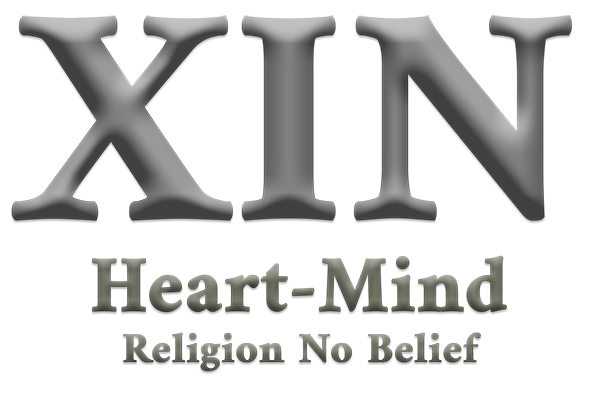
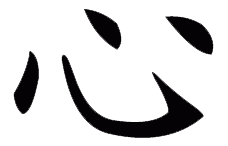

Love and Understanding

The Three Universal Truths:
1. Everything is impermanent and changing, i.e. there are no "things"
out there.
2. Impermanence leads to maladaptation, making adaptive subsystems evolvable.
3. Self and Other, concepts of what-is, beliefs, are explanatory fictions, stories.

The Four Humancentric Truths:
1. Humans, the storytelling animal, suffer (the Truth of Error, Ignorance, Illusion).
2. Suffering is caused by our attachment to belief-based stories (the Origin of Suffering).
3. Desire, craving for true belief, and attachment can be overcome (the Truth of Belief-cessation).
4. The way to overcome them is to listen to Nature who has all the answers, to the heart-mind (the Truth of Xin).

The Dao of Xin involves 28 ways of behaving,
relating to wisdom, morality and meditation.
Each way depends on the others.

The Way (Dao) of Xin
(aka Xin Mindfulness)
The 42 + 32 + 21 + 1 PreceptsXin: Inquiry-based religion of/by/for the autodidact having a fool for a teacher.
Xin Dogma: The dogma of no dogmas; the paradigm of no true paradigms.
Xinism: The endeavor to listen to Nature who has all the answers.
Xingha: A Xin community of 5-85 inquirers that auto-organizes.
Xin Ontology: All is matter/energy system; not a thing is.
Xin Ethics: System over self; ∴ endeavor to think well.
Xin Epistemology: Know-nothings tell no true stories.
Xin Axiology: Facing the what-is without flinching.
Xinosophy: The love of heart-mind understanding.
Xinology: The study of heart-mind system dynamics.
Xinist: One who endeavors to get right with Mother.
Xinsattva: A being that seeks the humility of not knowing.
Xinmartyr: One who dies to make the world safe for abelief.
Xinization: A complex society living properly with the planet.
Xin Diem: Persist unbounded through the day...free, curious, uncertain.
Xin-man: A hu-man storytelling animal that does not believe their own stories.
Xin Narrative: We, Homo narrator, tell stories and yea verily there are no true stories to tell.
Xin Conjecture: Science doesn't need religion, religion doesn't need science, but xinmanity needs both.
Xinocracy: Rule by choiceless awareness of the nature of things, beings, and systems.
Xingatha: Song of the wordless hymn that fills the universe with wonder.
Xindo: A shelter for refugees from modern techno-industrial society.
Xindeavor: To iterate towards love and understanding.
Xinlightenment: Liberation from the believing mind.
Xin Mind: A mind in a state of deeply held inquiry.
Xinquiry: Inquiry into the nature of the Not-two.
Xinmandment: Don't take your Self seriously.
Xin Dictum: Understand or die.
Xin: The antonym of hubris.
Xin Commandments:
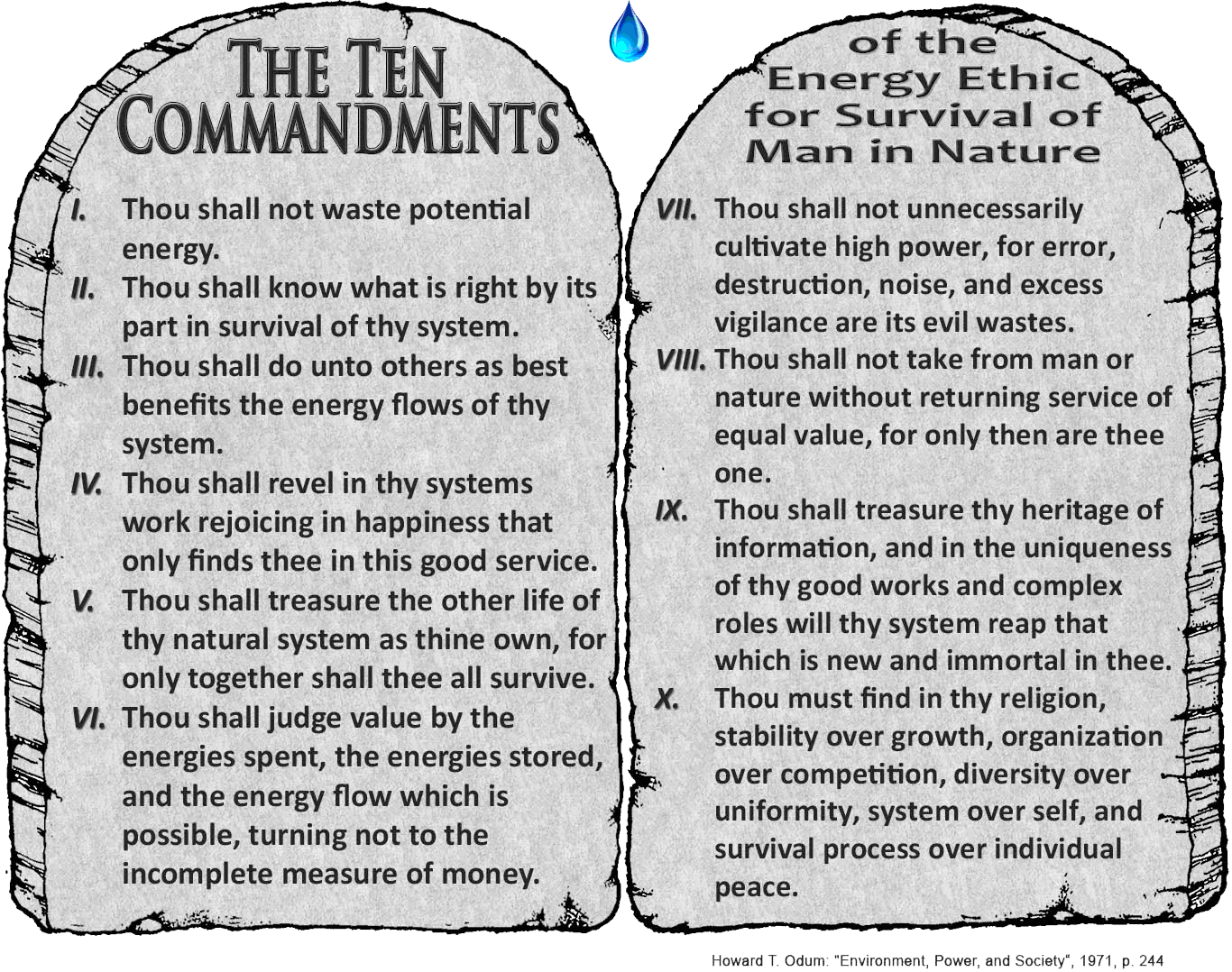
“It is quite possible that in contact with western science, and inspired by the spirit of history,
the original teaching of Gautama, revived and purified, may yet
play a large part in the direction of human destiny.”
— H. G. Wells 1920, The Outline of History
Modern ontological and epistemological presuppositions: that reality is both unambiguous and unchanging. Therefore human knowing can be perfect and unchanging. If you just know you are right, then you know of no good reasons to change your mind or foolishly doubt your certitude. Doing so is a sign of weakness, an existential threat to resist unto death. Embrace the remorselessly humancentric view of all Anthropocene enthusiasts who know truth.
Xin ontology and epistemology: that reality is thoroughly ambiguous as at best seen through a glass darkly and always changing as endlessly pulsing complex systems do. If you think you know something, view the condition as one of error, ignorance, and illusion. Doing so is one's best hope for iterating towards a better view, one that is remorselessly naturcentric. Nature doesn't care what you believe or disbelieve, like or dislike, so why should you?

The Xin Canon Library

Echos of the 'Masters'
Tao Teh Ching
Zhuangzi
Diamond Sutra
The Platform Sutra of Huineng
The Ch'an Teachings of Huang Po
The Tibetan Book of the Great Liberation
The Jesus Sayings
Xinxin Ming

Recent Echos of the Echos
How to Mindfully Meditate
The 14 Mindfulness Trainings
The 14 Thoughtfulness Trainings
Freedom from the Known
The Future of Humanity
My Life in Collapse
Science and Religion
Thought is your Enemy by U.G.
Mind Is a Myth by U.G.

Consilient Words
Consilience: The Unity of Knowledge
Environment, Power, and Society
Thinking in Systems: A Primer
The Limits of the Golden Rule
Ethics for a Finite World
The Whys of a Philosophical Scrivener
The Teachings of Zhen
Host Comments

Discounted Words
The Shape of Things to Come
Science and Sanity
Semantography
Verbal Behavior
Industrial Society and Its Future
A Prosperous Way Down
Living Within Limits
Critical Mass
Reality 101

More Prattle
THE BOOK
Do You Live in the Glow?
Human Origins in Deep Time
Confessions of a Fideist
Celebrate Inquiry
Naturocracy Inc.
Human Population
Opposed to All Creeds
Why I am Not an Atheist

“The total number of minds in the universe is one." —Erwin Schrödinger
As Buddha, Heraclitus, Spinoza, John Locke, David Hume, William James and Ludwig Wittgenstein suspected or 'knew', the self does not exist as a separate/permanent entity, but as a narrative fiction. For a more recent 2009 case for the myth of the self: The Ego Tunnel: The Science of the Mind and the Myth of the Self by Thomas Metzinger. A review may be a start, and the book is available on bittorent and elsewhere. Also Self and No-self 2007 and The Useless Self 1998 by Jean-Michel Terdjman. Science provides supporting evidence: The Self Illusion, 2012. Losing Ourselves: Learning to Live without a Self 2022 Jay L. Garfield—Why you don’t have a self—and why that’s a good thing.
The me, myself and I as a ray of consciousness, a tunnel vision, is a narrative. Eyes close; eyes open. The 'I close and open my eyes' is narrative, based on memory and selection, the telling of a story of a conscious entity. A 'sense of self and other' is the original story told by the storytelling animal as socially shared explanatory fiction, as foundational conceptual dualism. Many other stories, a multiplicity of beliefs, attach to Self, which is no-self, and to Other, which is another fiction. We believe in our narrative of the world only because of our ignorance. The self as narrator gives meaning, tells stories. Without the pathology of Self and Other, the what-is IS. It is possible for the xinlightened to tell stories (without a sense of Self, without the illusion of ego over system) about complex open thermodynamic systems.
Xin is not an organized religion. Organized religions are religious control systems based on beliefs that can be virally spread within memetic systems. The religious quest/impulse (fideism, literally "faith-ism"), is not a matter of for/against, is/isn't believing. Faith is based on idiosyncratic need, as William James argued. When verbally expressed, fideism takes the form of a belief. For example, "I have a need to believe that eventually we'll have a human on the planet that really does understand it and can live with it properly" is a fideist expression (of James Lovelock et al., other fideists being Occam, Pascal, Kant, James, Kierkegaard, Wittgenstein, Peirce, Unamuno, Zhen, and Martin Gardner) that implies a recognition of potential, not belief-based certitude. “Let us not pretend to doubt in philosophy what we do not doubt in our hearts.” ― Charles Sanders Peirce
Epistemologically, faith and belief differ foundationally. Religious doctrines may be expressions of faith, a faithist may be cited as a source, even though faith as inquiry/impulse is not belief based. It is entirely possible to be a fideist and believe nothing. Religious intellectual inquiry is the endeavor to understand faith as a characteristic quality or potentiality of human life, that propensity of hu-mans (hubris humans) that across the centuries and across the world (within complex societies) that has given rise to a prodigious variety of religious forms, and yet has remained elusive and personal, prior to and beyond the believing forms that fideism has mutated into. The challenge is to understand the impulse that lies behind the belief-based forms, and the meaning/addictions that they have conferred/inflicted upon their billions of adherents. [Partly paraphrased from Wilfred Cantwell Smith’s book “Faith and Belief: The Differences Between Them.”]
To the unrepentant Modern scoffers who have drunk the cool-aide of 1st Enlightenment science, you view your standard of truth as the only standard and dismiss those who might inquire outside your paradigm. To equate “religion” with a set of “beliefs” is a recent Modern invention, commonly accepted as an adequate and proper characterization of religion. Since “religion” has not always been thought of as equal to “beliefs”, then there may be something else going on with folks who are religious, something which reductionist dismissives, who view religion as the set of “their beliefs,” miss. No defense of “religion” is implied, but a need for conceptual clarity and adequate scholarship is.
Our challenge is to try to understand the concept "religion" more adequately. Science is not so fragile that we have to protect its truth from those who would consider religious inquiry. We face paradigmatic change that is more comprehensive than at any time in the last 1,000 years. Elites in our modern techno-industrialized world, who pretend to lead and inform the rest of us, don't know Xin. As things stand now, we face a terrifying future with little capacity to see a pathway through the mess of living complex messes we have unconsciously created.
There can be no defending religious and faith based claims about the unknowable, of things outside the cosmos. Modern views of “religion” and “faith” as atavisms was uncritically accepted by the more "progressive" thinking products of Modern culture and routinely taught as the truth of the matter in our universities in the mid-to late 20th Century by those lacking epistemic humility. [Prior three paragraphs mostly paraphrased comments of Ruben Nelson.]
That most religious scholars of the 21st Century have rejected dismissive views of religion could be another iteration in error, ignorance, and illusion as usual. Believe nothing. As has been said, “Paradigms change one funeral at a time.” There are no true paradigms, as Donella Meadows notes.
Albert Schweitzer's paradigm shift from human to Nature centric 1915, Ehrfurcht vor dem Leben [Venerate all Life]
“Man has lost the capacity to foresee and to forestall. He will end by destroying the earth.”
"Thought cannot avoid the ethical or reverence and love for all life."
[Or thought can, as it does now, and humans can go extinct.]
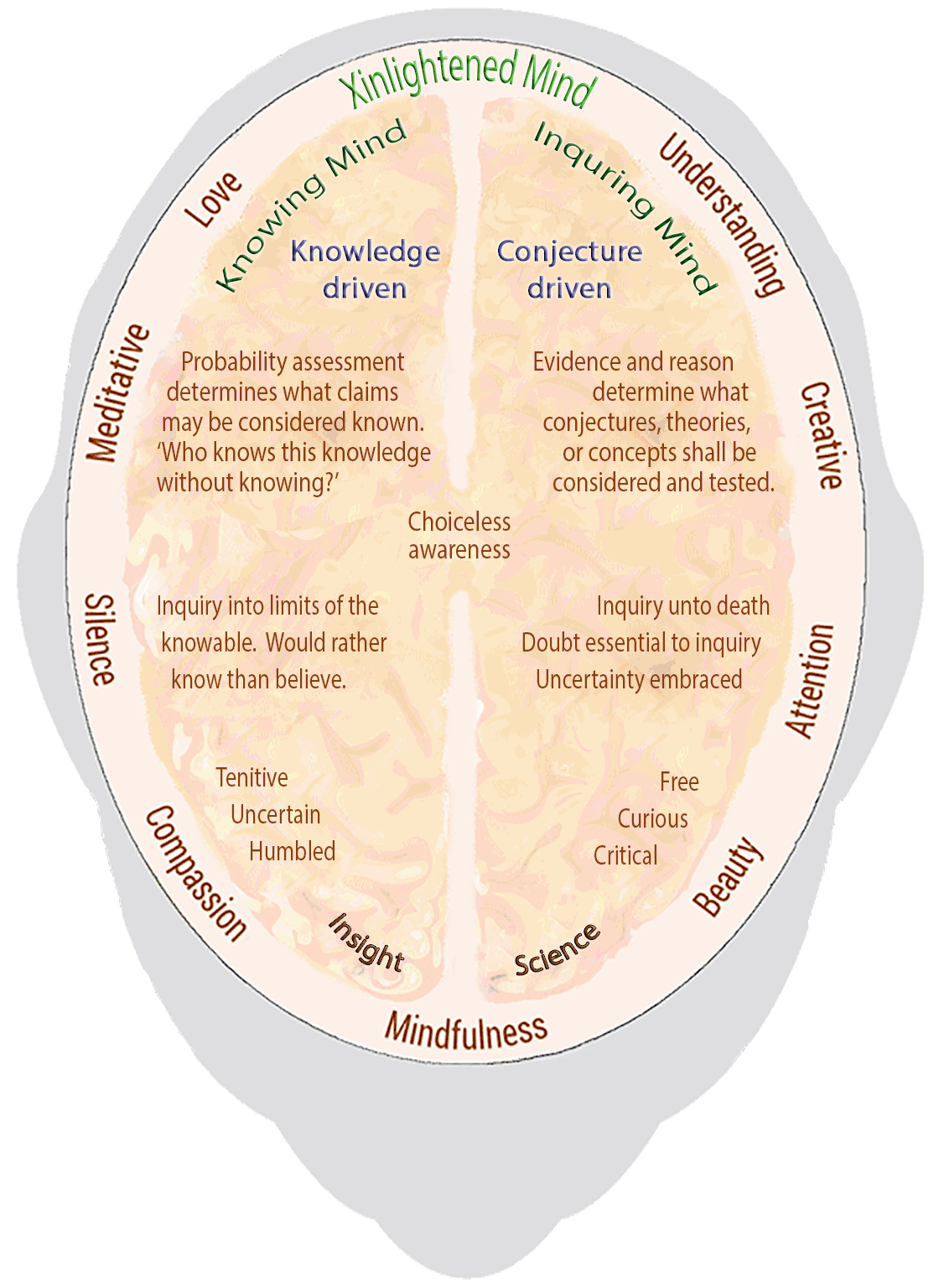
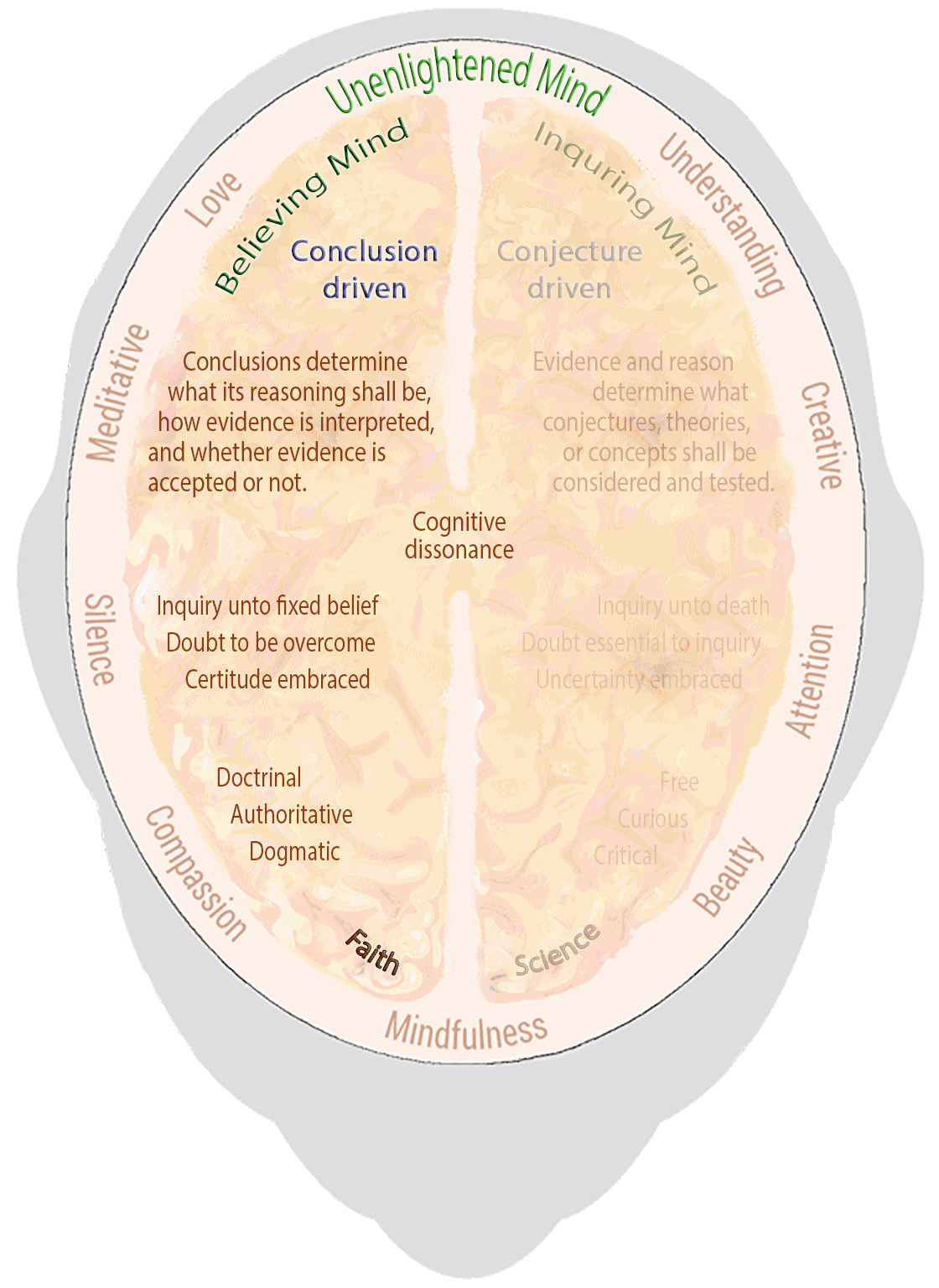

"By enlightenment I mean believing in nothing." — Shunryu Suzuki

Message for Modern Humans
“It is quite possible that in contact with western science, and inspired by the spirit of history, the original teaching of Gautama, revived and purified, may yet play a large part in the direction of human destiny.” — H. G. Wells 1920, The Outline of History
The Four Conjectures:
1 Suffering — the condition of being modern humans
2 Origin of suffering — the arising of r-culture
3 Cessation of suffering — living within limits
4 Pathway that leads to the cessation of suffering — sankofa
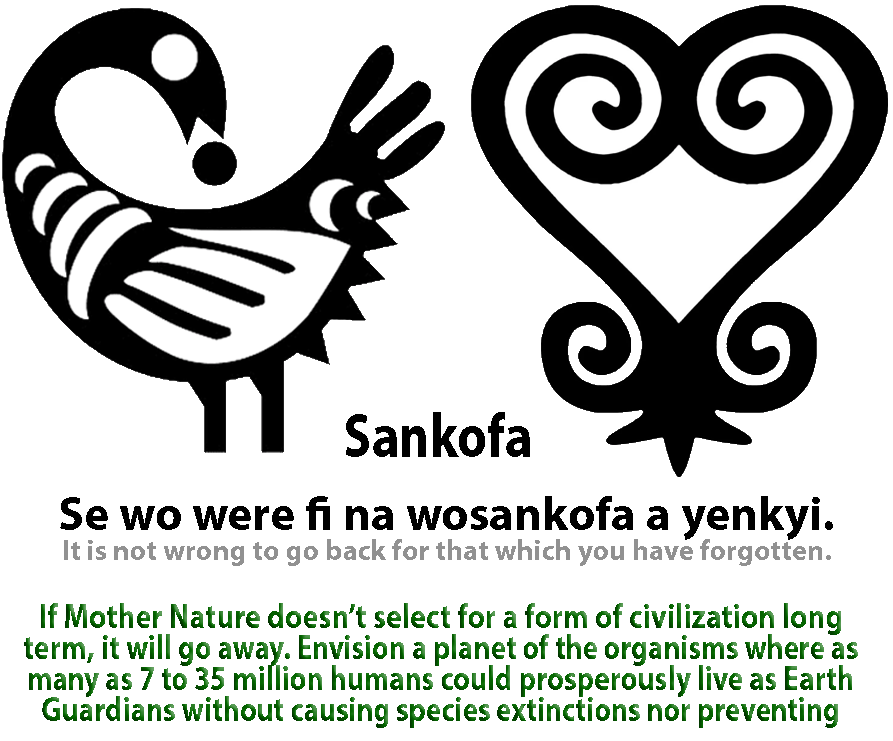
Note: r-culture arose as a pathological form of civilization about 75k years ago within the default K-culture of our K-strategist ancestors going back two hundred millions years (because for mammals, that’s what works long term to persist). We are the climax of r-acculturated humanity’s succession (our taking of a planet).
The Three Jewels:
1 Information
2 Love and understanding
3 Mothers of loving grace

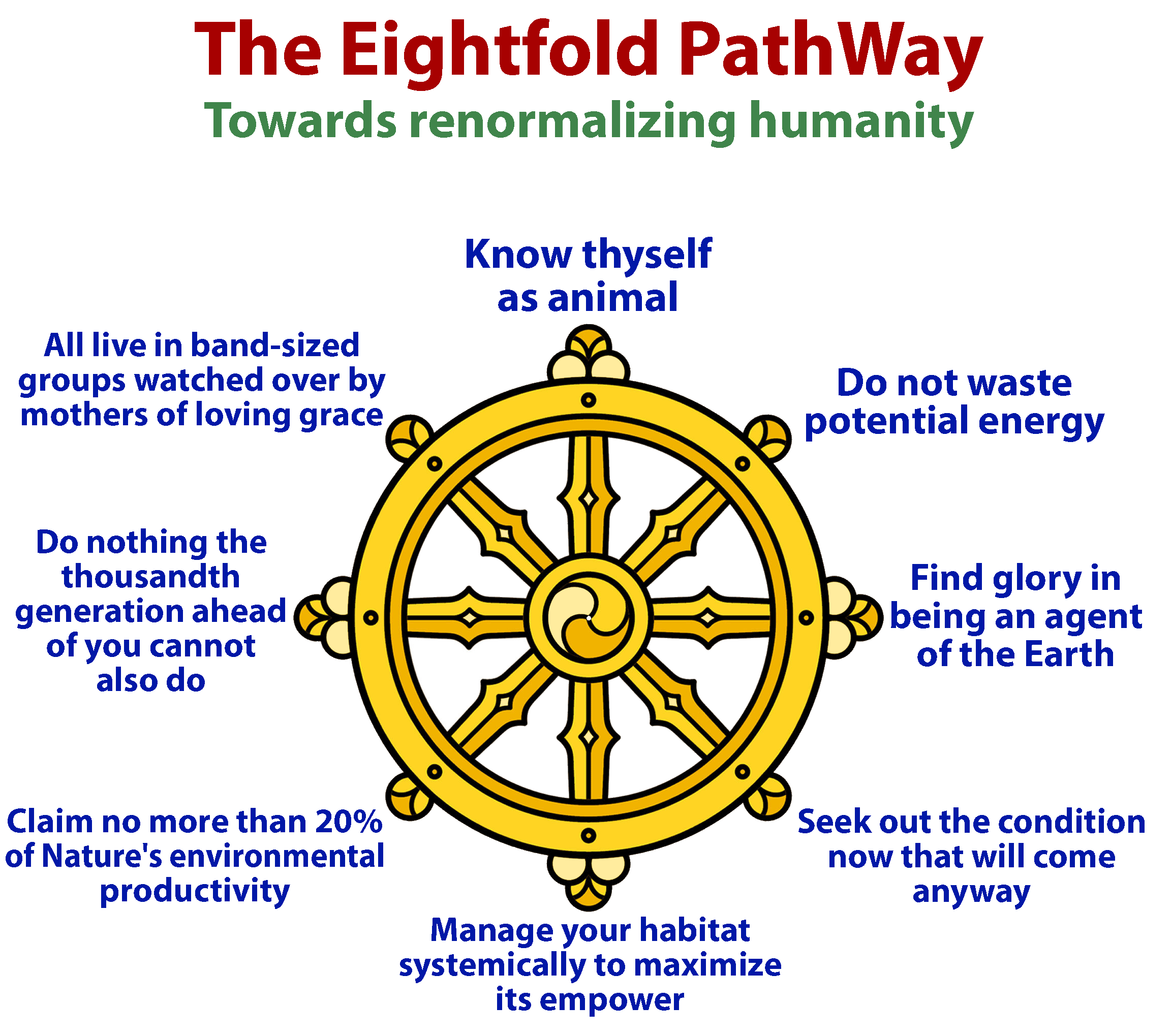

On Narratives/Paradigms
'There is one leverage point that is even higher than changing a paradigm. That is to keep oneself unattached in the arena of paradigms, to stay flexible, to realize that no paradigm is "true," that everyone, including the one that sweetly shapes your own worldview, has a tremendously limited understanding of an immense and amazing universe that is far beyond human comprehension. It is to "get" at a gut-level the paradigm that there are paradigms, and to see that that itself is a paradigm, and to regard that whole realization as devastatingly funny. It is to let go into not-knowing, into what the Buddhists call enlightenment.'
'People who cling to paradigms (which means just about all of us) take one look at the spacious possibility [vastness without holiness] that everything they think is guaranteed to be nonsense and pedal rapidly in the opposite direction. Surely there is no power, no control, no understanding, not even a reason [narrative/story] for being, much less acting, embodied in the notion that there is no certainty in any worldview. But, in fact, everyone who has managed to entertain that idea, for a moment or a lifetime, has found it to be the basis for radical empowerment. If no paradigm is right, you can choose whatever one will help to achieve your [life-driven] purpose. If you have no idea where to get a purpose, you can listen to the universe.' [Nature, who has all the answers.]
'It is in this space of mastery over paradigms that people throw off addictions [their purpose-driven consumer life], live in constant joy [when not dealing with life debilitating situations], bring down empires, get locked up, or burned at the stake or crucified or shot, and have impacts that last for millennia.'
'There is so much that could be said to qualify this list of places to intervene in a system. It is a tentative list and its order is slithery. There are exceptions to every item that can move it up or down the order of leverage. Having had the list percolating in my subconscious for years has not transformed me into a Superwoman. The higher the leverage point, the more the system will resist changing it—that's why societies often rub out truly enlightened beings.'
'Magical leverage points are not easily accessible, even if we know where they are and which direction to push on them. There are no cheap tickets to mastery. You have to work hard at it, whether that means rigorously analyzing a system or rigorously casting off your own paradigms and throwing yourself into the humility of not-knowing. In the end, it seems that mastery has less to do with pushing leverage points than it does with strategically, profoundly, madly, letting go [of belief-based paradigms to enter into not-knowing] and dancing with the system.'
—Donella Meadows, Thinking in Systems: A Primer]
Belief and inquiry do not co-exist well, so beliefs dominate (or must pass away).
Religion may be more about being centered than right or left justified.
Sapience and doubt and inquiry are interdependent.
Contact webmaster
or not
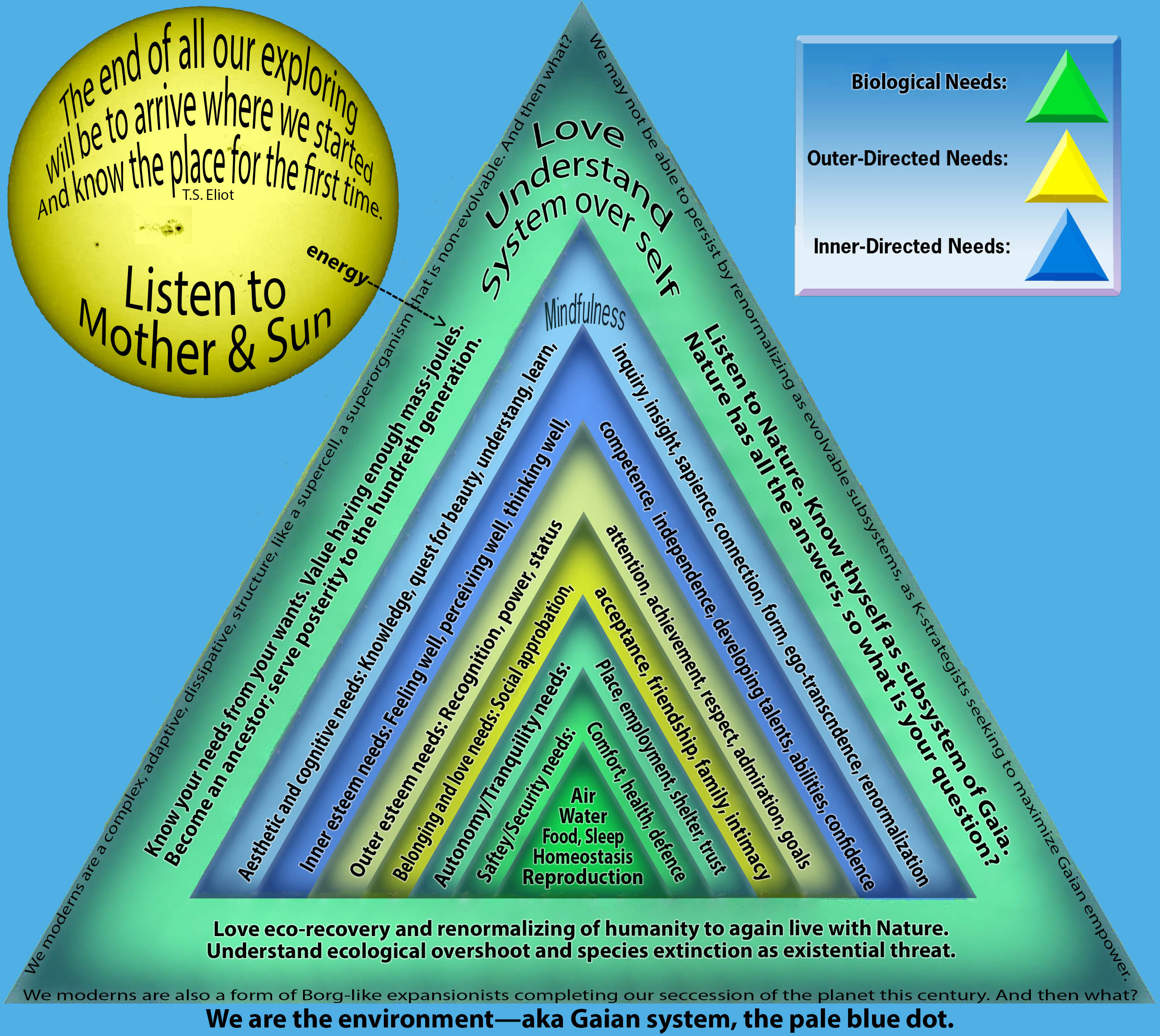
Know then your needs from your wants.